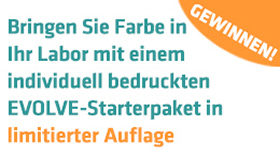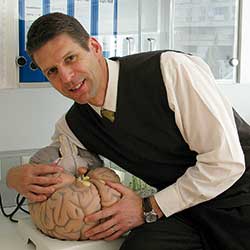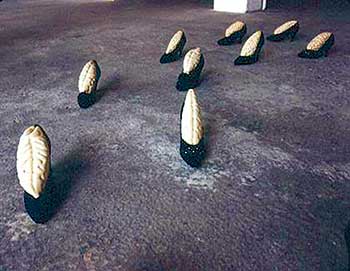Brain Gain in the Western Balkans
Career strategies for young European scientists
by Livia Puljak, Labtimes 03/2008
Several programmes have been launched to motivate Balkan scientists to return to their home countries. In addition, however, the public institutions there have to make sure that they are happy once they return.
At a conference a couple of years ago I met a tall blonde scientist from Belgrade. After chatting for a while, he said he would soon be leaving Serbia to continue his research in the USA. I said it was a shame that his country was being drained of yet another brain. “Not really,” he replied, “I am blonde so it will only be a loss of enthusiasm”.
Scientific enthusiasm is something that Eastern Europe can also hardly afford to lose. These countries have borne the cost of educating their most brilliant youngsters only to see them go west, seeking money, adventure and well-funded laboratories. Although, remarkably, no demographic data exists, it is generally assumed that Eastern Europe is losing scientists to the United States and the richer parts of Europe. To reverse this brain drain, a number of new initiatives have been launched.
Recently, East European politicians have started to echo their Western counterparts and to embrace concepts which have defined entire science and technology policies. For better or worse, phrases such as ‘high technology’, ‘national systems of innovation’ and ‘information-based economy’ have become truly international. Since educated and skilled workers are the driving force of emerging knowledge-based economies, ‘brain gain’ has become a buzzword in East European corridors of power. As a result, different schemes for attracting scientific expatriates have rapidly started to proliferate.
Croatia wants its brains back
In Croatia most of the talk about brain gain comes from the Ministry of Science, Education and Sports (MSES). In 2004 MSES organized the first Congress of Croatian Scientists from Croatia and Abroad, which attracted over a thousand Croatian scientists and prominent political, business and social figures. The event sent out the message that investing in people, education, and knowledge is both valuable and effective. Shortly after the congress the Croatian Minister of Science, Dragan Primorac, invited emigré academics to return home. At the same time, he urged the rectors of Croatian universities to fast track the job applications of scientists with excellent scientific backgrounds or extraordinary potential whose permanent return to Croatia would clearly contribute to the development of Croatian universities.
MSES organized a second Congress of Croatian Scientists from Croatia and Abroad in 2007 and much of the Croatian media coverage was devoted to a handful of returnees. MSES even maintains a list of returned scientists on its website, currently stalled on seven and perhaps not the most credible source of information. How much these congresses have contributed to brain gain, it is hard to tell. One scientist did not show up at the second congress, in Split, explaining that he met his wife at the first one and that there was no reason for him to attend the second now that he was happily married.
Pick your programme
Besides matchmaking, the Croatian government has devised additional programmes to lure back the leading scientists it previously lost. In 2001 the Croatian parliament established the National Foundation for Science, Higher Education and Technological Development of the Republic of Croatia (NZZ). In October 2004 the NZZ made its first calls for proposals within the brain gain strategic area: programmes for senior, visitor and postdoc scientists aimed to encourage Croatian and foreign researchers to conduct research in Croatia. Two years later, the NZZ came up with their homing programme, to help Croatian and foreign researchers set up research infrastructure in Croatia and joined the EMBO installation grants initiative for the same reason.
“Within these programmes, the NZZ has supported 52 both young and experienced excellent researchers with more than €2 million,” says Professor Pero Lucin, President of the Board of the NZZ. “Among them, only 13.5% are researchers of non-Croatian origin. All funded researchers met high evaluation criteria on the national and international level”.
In 2008 the NZZ plans to support the six best young Croatian and foreign researchers with more than €800,000, under a new programme entitled NZZ Installation Grants, and to award more than €1.5 million within other existing programmes. Some of these programmes try to marry the career necessity of research abroad and the human capital interest of Croatia: they fund a period abroad, but contain a reintegration period at the end to make sure the scientists are not lost forever. “The term ‘brain gain’ for the NZZ includes exchange and increase in knowledge and in people that own knowledge and we are constantly trying to answer these challenges with our programmes,” adds Lucin.
World Bank loan for brains
The government of Croatia also designed the Unity through Knowledge Fund (UKF), supported by a World Bank loan. This programme is aimed at encouraging Croatian scientists and professionals working abroad to return and work in Croatia or to develop connections with local scientists. Thus enabling Croatian institutions and researchers to use the potential of Croatian scientific and professional expatriates.
“The UKF has a four-year budget of €5 million for four programmes that are connecting Croatian scientists in Croatia and abroad,” says professor Mile Dzelalija, President of the UKF steering committee. “Eleven co-operability projects worth €1.9 million have already been started, and these projects are bringing another €0.8 million from other financial sources, which include domestic and foreign institutions and industry,” adds Dzelalija. He is very proud of the fact that the UKF is introducing new models of research co-financing, while choosing projects that will be financed in an open and competitive manner.
Dzelalija offered further information about the current state of affairs at UKF: so far the success rate of UKF grant applications has been 26% and right now about 90 grant applications from young investigators are being evaluated. UKF also supports the short-term mobility of young and experienced investigators with grants of up to €10,000. At the moment, UKF has open calls for companies who want to hire postdocs in industry, worth about €30,000, as well as new calls for returnees and cooperation with the homeland of up to €200,000.
What awaits those who return?
One of those who returned to Croatia after a successful scientific career abroad (but not listed among the seven returnees on the MSES web site) is Professor Ivica Grkovic, who worked at the University of Melbourne, Australia for 12 years. For the last three years he has been working at the University of Split School of Medicine, Department of Anatomy. His return was influenced by the increasing competitiveness of Australian science and a desire to raise his three children in Croatia. He faced multiple problems upon return, but says that none of them were insolvable.
“I came back with my family in good faith, without a contract, simply because I had a word from the Dean that the position will be mine,” says Grkovic. However, the council that was supposed to approve his appointment failed to include him in the meeting’s agenda and because of that he became a state employee three months later than he was supposed to. In the meantime the School of Medicine paid his salary from discretionary funds.
“Then I signed up for the special loans for university employees, which have very low interest rates. I was the first on the list at the University of Split and I was told to find an apartment within a month. I found my new living space, paid a deposit and I did not get the loan.”
Once he had state employment and after having to resort to alternative housing funds, Grkovic was hoping to get a research grant from the state. However, alas, the Croatian government introduced a temporary embargo on state-funded grants, which lasted for two years.
There were more challenges ahead of him when he tried to enrol his Australian-educated children in Croatian schools and kindergartens. Despite all this, he is now happy to be in Croatia. “I am content knowing that I am contributing to the development of my own country and educating future Croatian health professionals. I have an opportunity to make a difference in Croatia and although there were some problems initially, the institution and my colleagues were always there to help.”
Brains wanted in new countries too
The youngest European country is also following the trend. Kosovo was declared independent from Serbia on 17th February 2008, and, three weeks later on 14th March, their Ministry of Science, Education and Technology launched a national brain gain programme with the goal of engaging the Kosovan diaspora in the development of their country.
“The government is determined to encourage highly educated professionals from Kosovo and abroad to get involved in the process of state building in Kosovo,” the Ministry announced. A successful brain gain campaign should help ease the “difficult socio-economic circumstances and improve the low living standards” which are among the reasons that a majority of highly educated citizens have chosen to leave Kosovo in the first place. The government will try to offer educated citizens better working conditions so that they have an incentive to contribute to the country’s development and these efforts will focus mainly on migrants with high academic qualifications.
The press release also invites all Kosovar students, researchers and professors who are studying, lecturing and working outside the country to register on the government’s database by submitting their CVs.
“Our call for the diaspora to register for the Brain Gain Programme was very, very positive,” says Mr. Kapllan Halimi, Coordinator of the Brain Gain Programme of the Government of Kosovo. “In less than a month we had more than 150 applications from different fields. 75% of candidates who have been registered have MSc and PhD degrees. The will of registered candidates to return is very high.”
Ministry yes, programmes no
Serbia even founded a Ministry of the Diaspora in 2004 as a result of the need to develop ties between the motherland and expatriate Serbs in a more systematic and thorough manner. The Ministry has been given the task of fulfilling government policy on encouraging the reintegration of people who have emigrated from Serbia. However, the projects that this Ministry is financing are limited to the organization of cultural programmes, the enhancement of members’ rights in neighbouring countries, economic cooperation, cultural integration, science, sport and the preservation of the Serbian language. Funding is available only to organizations and not to individuals, with the Serbian Ministry of Science lacking any brain gain programmes at all.
Albanian initiative
The Albanian government is currently running a project entitled “Brain Gain: Engaging the Diaspora in Albania’s development” in cooperation with the United Nations Development Program (UNDP). The project will run from March 2005 to September 2008 and has a budget of $1 million. Mr. Bernard Zeneli, Project Coordinator, says that so far the project has focused its efforts on three interrelated areas: improving the legal environment, developing incentive schemes and developing the database of highly qualified individuals.
“Changes in laws and governmental decisions have been made to facilitate brain gain. Up to date more than ten laws have been changed in order to create legal space for financial incentives for graduate degrees earned abroad and positive discrimination in the process of applying for a job with the public administration department. Also, the current government has agreed to treat the brain gain returnees with soft credit loans towards apartment or house purchases,” says Zeneli.
The Albanian project has developed incentive packages specifically related to returnees working in public administration and in the university sector. “We piloted an intervention in the newest state owned university in the town of Durres and have started a pilot in the public administration sector with 20 new positions specifically opened for people with skills that cannot be found in Albania,” explains Zeleni.
As for a database, an invitation to the lost brains was posted on the project’s web site, www.braingain.gov.al, which offers the possibility of registering on the database, participating in Internet forums and applying for different policy and academic positions.
The Slovenian Way
Slovenia founded the Slovenian Research Agency (ARRS) as an independent public funding organisation to perform tasks relating to the national research and development programme and the creation of a European research area. Dr. Janez Slak, Assistant Director of ARRS says that there are no programmes in ARRS that would fall directly under the heading of brain gain programmes. However, in their public tenders for financing research projects, they also call for candidates with postdoctoral experience and encourage foreign researchers to apply. “There is one condition: they have to apply through a Slovenian research organisation which is ready to employ them for the period of the duration of the project in case the candidate´s postdoctoral research proposal is chosen for financing,” says Slak.
ARRS’s other initiative is the Young Researchers Programme in which they finance the study and research necessary to obtain a PhD for four and a half years. This initiative is aimed at foreign students and information is disseminated through foreign embassies in Slovenia.
Joint initiative
In 2002 The European Molecular Biology Organization (EMBO) and the Howard Hughes Medical Institute (HHMI) launched a joint initiative to attract the world’s most promising scientists to Central Europe and to help them establish their first independent laboratories.
Within the framework of its international programme, HHMI awarded nearly $2 million to EMBO, used to support EMBO/HHMI young investigators and scientists in the Czech Republic, Hungary and Poland. However, this grant has been cut in favour of EMBO/HHMI startup grants, currently benefiting science in Croatia, the Czech Republic, Estonia, Hungary, Poland and Slovenia.
As one of the largest philanthropic organisations in the world, HHMI has supported outstanding scientists in Central and Eastern Europe, Russia and Ukraine since 1995, reflecting the Institute’s commitment to scientific excellence as a global enterprise. For these awards HHMI will contribute $50,000 a year for three years for up to six grants. Another $25,000 a year per grant will come from the participating member countries and EMBO.
On the other side of the equation is EMBO itself, which was established in 1964 and promotes excellence in the molecular life sciences in Europe through targeted programmes and activities. EMBO will oversee the EMBO/HHMI startup grants as part of its Young Investigator Programme, which has been identifying and supporting exceptional young scientists in Europe since 2000. Scientists need to apply for this grant jointly with research institutes in the countries where they intend to establish labs. In the future the startup grants will be continued as strategic development installation grants. Funding will come from participating member states.
Public and private solutions in southeast Europe
In 2003 a joint UNESCO and Hewlett Packard initiative resulted in a project called “Piloting Solutions for Alleviating Brain-Drain in Southeast Europe”. The project provided modern technological and financial facilities to young scientists from the region to cooperate within the framework of joint research projects with their fellow nationals living abroad.
Within the project HP donated equipment for grid computing to seven universities in Albania, Bosnia and Herzegovina, Serbia, and the FYR of Macedonia, enabling them to share computer power and data storage capacity. This was supposed to give students and professors an opportunity to stay in contact with leading authorities in their fields, principally through access to overseas libraries and cooperation with their fellow nationals abroad. Also, the goal was to slow down the flow of those who would otherwise leave for good.
The Alleviating Brain Drain in Bosnia, Croatia and Yugoslavia project was one of fourteen pilot activities of the strategy. According to the UNESCO website, the main driver of this UNESCO project in Serbia was Education Forum, a Serbian non-governmental organization and the aims of the project were the establishment of strong professional ties between the diaspora and their colleagues who have remained, and building on these contacts in order to strengthen links between institutions in the region and their counterparts abroad.
Furthermore, the UNESCO website states that a bilingual English/Serbian brain drain website was developed as a part of the project, with a publicly accessible web-based database of individuals and institutions in Yugoslavia and abroad. However, these sites no longer exist. No information is available about this education forum, nor about the Serbian bilingual brain drain website.
The project website for Montenegro is still operating and it even offers information about people who left the University of Montenegro between 1990 and 1998 (www.unesco-hp.cg.ac.yu/information.htm).
Wellcome is welcome
The UK‘s largest non-governmental source of funds for biomedical research (with an endowment of around £15 billion), the Wellcome Trust, is also part of the brain gain mosaic. Its International Senior Research Fellowships support outstanding postdoctoral scientists in establishing their scientific careers in Australia, New Zealand, South Africa, India and central Europe: the Czech Republic, Estonia, Hungary and Poland. Researchers from any country are eligible, the awards run for a period of five years and include a personal salary and ancillary support.
Brain circulation
A non-profit organization, The World University Service (WUS) Austria, offers a brain gain programme for all universities in Bosnia and Herzegovina, Serbia, Montenegro and Kosovo. WUS Austria was established in 1983 in Graz and is committed to the promotion of the human right to education on the basis of academic freedom and university autonomy. Since 1994, following the conflict in former Yugoslavia, WUS Austria has developed a regional focus on Southeast Europe.
The WUS brain gain programme aims at opening up the higher education sector in Southeast Europe by inviting academics who have emigrated to give short-term lectures at the university faculties in programme countries. This programme intends to link these guest lecturers to already existing networks in their home countries and convert them into a driving force of knowledge transfer. Thus, this programme is more about brain circulation, but it certainly has its benefits. To foster the cooperation between Austrian institutions and universities in Southeast Europe, the programme is also open to Austrian lecturers.
Discussions, meetings, policies
There are other projects in Eastern Europe that are focused more on preparing the ground for actual brain gain programmes. These projects are set up to analyze the current situation of the academic and intellectual labour market in Eastern Europe, to have meetings and discussions about brain drain and to create policy recommendations for alleviating it.
As Europeans well understand, statements of intent only take you so far. There is a real danger that analysis and recommendations will fall well short of the hard financial decisions that are necessary if Eastern European intellectuals are to return home. However, fortunately there is now a precedent. Governments and agencies that have been charged with reversing brain drain can take the template of successful programmes in other Eastern European countries and implement them in their own countries.
Reintegration grants for returnees are especially good brain gain instruments because basic researchers’ salaries in Eastern Europe are not competitive and would hardly persuade a successful scientist to give up the riches of the West for a meagre academic salary in the East. Setting up foundations for science, obtaining World Bank loans and creating non-profit organizations which will then provide brain gain programmes, are just some of the potential options out there.
The whole package
Reintegration grants are a necessary and useful tool for repatriating scientists who want to return home. However they are not a panacea; there are other problems that also need to be solved. In Eastern Europe, academic hierarchy and tradition has still remained deeply ingrained, preventing young scientists from carrying out independent research. Salaries are not competitive. Research infrastructure may be problematic. Also most laboratory supplies need to be imported so they end up being more expensive then in the country of origin.
Therefore, Eastern European countries need to make fundamental changes in the way science is done in their public institutions to make sure that the brains are happy once they return. If not, the returnees may not stay.
Last Changed: 09.06.2012









